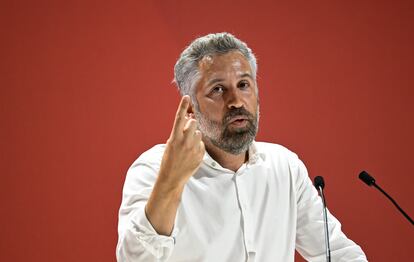
Portugal will have new Budgets in 2025 and closes the door to political uncertainty which could have led to elections, which would have been the third in three years. He Socialist Party (PS)the main opposition force, will abstain from the vote to allow the project presented by the Government, a center-right coalition led by Luís Montenegro and which lacks a majority in Parliament, to go ahead.
“If the Budgets are not approved, it could lead to the holding of the third legislative elections in less than three years, with no prospect of the result being a stable majority,” the socialist leader said late on Thursday. Pedro Nuno Santosat his party headquarters. Thus, he justified his position. However, Nunes also warned that nothing binds them to the Executive of Montenegro. “Is an isolated, more minority government than ever and totally dependent on the largest opposition party, the PS. We do not have a commitment with him, but we do have a commitment with the Portuguese,” he wrote on the social network X (formerly Twitter).
Although the proposal will be debated and voted on at the next meeting of the national political commission of the PS, called for next Monday, the abstention defended by its leader clears up the great unknown that has been experienced in Portuguese politics in recent months. It would be an unexpected turn if the political commission rejected its leader’s proposal, taking into account the existence of a current that was betting on giving the Government a free hand for next year.
Internal debate
In the socialist family itself there was a division regarding the line to follow: the most centrist wing was in favor of allowing the Government to approve the Budgets, while the most leftist wing, in which Santos has traditionally been placed, was inclined to vote against.
In recent days, pressure had intensified on the PS, which lost the elections in March by a narrow margin compared to the Democratic Alliance coalition, to avoid a new political crisis in the country. Although the Government could work with extended budgets in 2025, there was a risk that the President of the Republic, Marcelo Rebelo de Sousadissolved Parliament and called early elections. The precedent was set by the head of state himself in 2021, when he ended the legislature after the opposition overturned the Budgets of the socialist Government Antonio Costa.
Prime Minister Montenegro celebrated the news from Brussels and praised “the sense of responsibility” of the center-left. The Government was unable to reach parliamentary agreements with any force to guarantee a majority to support the Budget in the plenary session to be held at the end of October, despite the fact that it negotiated from left to right.
Montenegro’s encounters with the extreme right
The Government’s main commitment in public had always been the negotiation with the socialists, although in private they also held several meetings with the leader of the far-right, André Venturaof which the country was not informed until Ventura revealed them in several interviews. Montenegro refused to confirm whether he had met on five occasions – four secret and one public – with the leader of Chega (Ventura’s populist formation), although he denied that he had offered him to enter the Government in the future, as his party had stated. counterpart.
Chega has changed his opinion several times regarding the budget vote, but his 50 deputies—the third most important group in the Assembly of the Republic—will end up voting against it. “It is a profound betrayal of the right and its electorate,” criticized Ventura, who criticizes the increase in indirect taxes to compensate for the reduction in direct taxes. “It follows the same logic as the PS budgets,” he criticized.
The Budget project contemplates some measures demanded by the socialists in fiscal matters, such as a reform of the IRPF aimed at those under 35 years of age (IRS Jovem) that delves into progressivity. The Government’s initial design consolidated in practice an alternative regime without progressivity that earned criticism from the International Monetary Fund (IMF). In addition, the Corporate Tax (IRC, as it is known in Portugal) will be reduced from 21% to 20%.
With the guarantee that the Budgets will be passed in Parliament, the Government gains time and guarantees a minimum of two years of legislature. Even if it does not obtain support to approve those of 2026, the Chamber can no longer be dissolved by the President of the Republic, who has that prerogative but is prevented from using it in the last six months of his mandate. Rebelo de Sousa will be in that situation in the second half of 2025.

